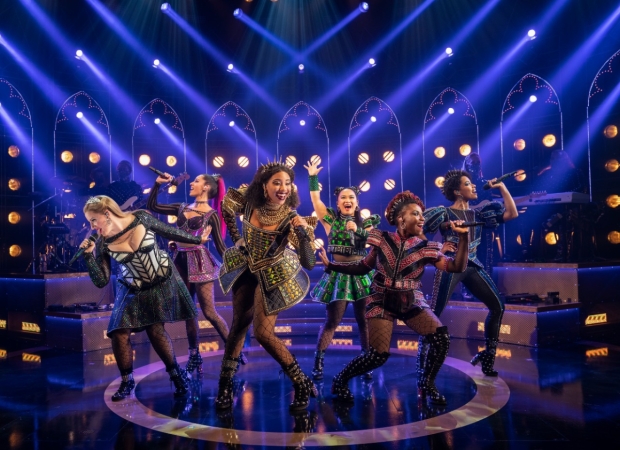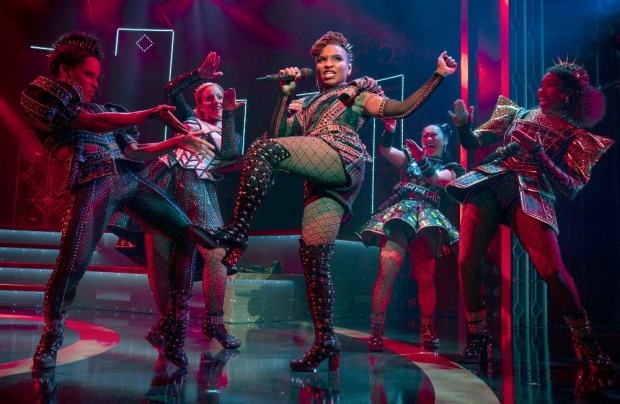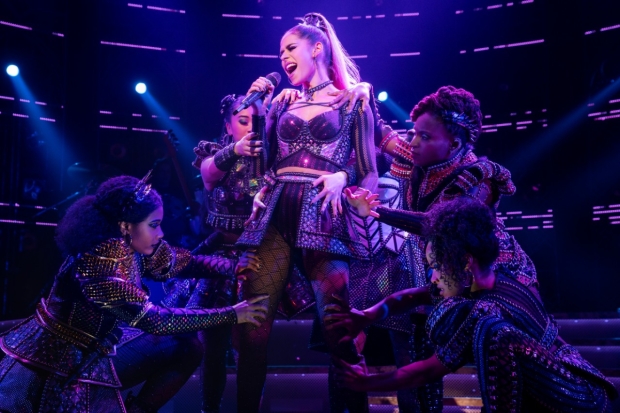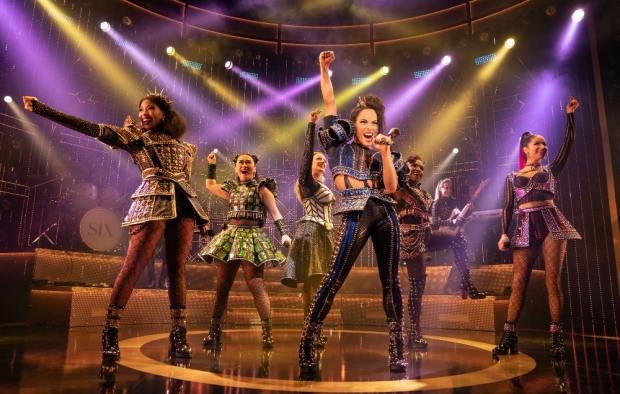Six Is Back. And These Queens Don't Need Your Pity
Toby Marlow and Lucy Moss’s pop concert about Henry VIII’s ex-wives officially opens its doors on Broadway.

(© Joan Marcus)
I vaguely recall writing one of these reviews already. I had finished typing out my eloquently phrased thoughts — which largely amounted to, "Six is so freaking fun" — and set it to run on March 12.
Of course, we all know what happened next. Six's original opening is now the date that will live in infamy as the night the lights went out on Broadway. So here we are, 19 months later, and as Six poises itself for a successful second attempt, I can confirm, Six is still so freaking fun.
Not to worry, my thoughts on the show do extend beyond that, as do its merits. Six — Toby Marlow and Lucy Moss's Edinburgh Fringe Festival hit turned international addiction — certainly has the veneer of a glittering pop confection. And it is (lighting designer Tim Deiling makes Emma Bailey's efficient set with medieval hues look world-tour-ready). But it's a glittering pop confection with enough teeth and muscle to turn a mnemonic device of history into an attention-worthy piece of herstory.

(© Joan Marcus)
Divorced. Beheaded. Died. Divorced. Beheaded. Survived. The premise of Six is wrapped in that banal rhyme. Henry VIII's six wives don the silhouettes (costume designer Gabriella Slade joins Tudor fashions with Gaga couture) and vocal chords of pop divas to duke it out for the title of most tragic ex. For what reason? To shake the single reductive word that describes each of their partings from Henry and emerge a flesh-and-bone human. Why must there be only one woman deemed worthy of such basic human dignity? If you're asking that question, you've already cracked the slightly saccharine but altogether gratifying thesis of the show. Rest assured, it's not a spoiler that makes the "competition" any less thrilling to watch (make an effort to peel your eyes from the queens every once in a while to admire the all-female onstage band as well).
Even if the ladies' rivalry turns out to be a sham, it is quite a musical feat — for composers Marlow and Moss, as well as the performers delivering their material — to keep it such a nail-biting race with no clear front-runner. Adrianna Hicks, as Catherine of Aragon, throws down the gauntlet with Beyoncé-level vocals in "No Way," an explosion of righteous anger about how Henry ended their 24-year marriage when she failed to produce an heir. The small but mighty Andrea Macasaet, as Anne Boleyn, counterpunches with demure savagery in the earworm "Don't Lose Ur Head," winning over the crowd with a performance that spiritually turns from a winky-face emoji to the fire Elmo meme. How do you beat that? An Adele-esque power ballad from Henry's one true love, Jane Seymour, of course — though Abby Mueller's monumental stand-and-deliver performance of "Heart of Stone" added a dash of Celine that I don't recall the first time around.

(© Joan Marcus)
Brittney Mack revives us with an injection of pure fun in her number "Get Down," showcasing Carrie-Anne Ingrouille's energizing choreography as Anna of Cleves, the German wife who got off easy thanks to simple neglect. Samantha Pauly then reels us in as wife number five, Katherine Howard, with her gut-punch of a performance of "All You Wanna Do." Though she dons Ariana Grande's signature pony, she is clearly a Britney figure through and through, from a tune that harks back to the era of Circus to the song's sudden tonal shift from a tale of carefree flirtation to one of sexual trauma. And then there's our survivor, Catherine Parr, played by a beautifully self-possessed Anna Uzele, who blends female liberation with wisps of Alicia Keys (sound designer Paul Gatehouse works magic balancing the mix of vocals and meeting each solo's musical style, all while keeping the audience's eardrums intact).
In the 19 months since Six just missed its opening night, it's been interesting to see how eager fans are to add Moss, Six's co-director (as well as co-author) alongside Jamie Armitage, to her own musical's roster of pitiable queens. If the show had opened as planned, Moss, then age 26, would have been able to officially claim the title of youngest female director ever on Broadway. Now, at the ripe age of 27, she must share that title with the late, brilliant, Elizabeth Swados, who brought her own scrappy musical, Runaways, from the Public Theater to Broadway in 1978. Another unwitting competition among fabulous women bites the dust, and Six gets to return to Broadway practicing exactly what it preaches: Embrace power, not superlatives.

Adrianna Hicks (Catherine of Aragon), Andrea Macasaet (Anne Boleyn), Abby Mueller (Jane Seymour), Brittney Mack (Anna of Cleves), and Samantha Pauly
(Katherine Howard).
(© Joan Marcus)








